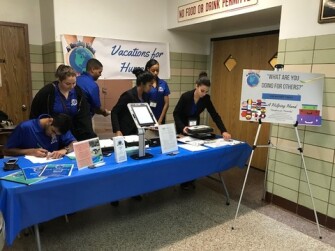
Students are working together in their companies. Each young person has a role in the company that is essential to the company running smoothly and they are empowered to understand the different functions of the company, often rising through the ranks in their two year sequence.
Room 104 is always buzzing. Much like my student-run newspaper class, Virtual Enterprise (VE) is student-led with West Hempstead High School teacher, Michael Silberman directing students in the best way to develop their companies.
VE is a class that brings the business world to high school. At West Hempstead High School, students can elect to take the class in both 11th and 12th grade and the longer they invest, their learning grows exponentially as do their leadership skills. Silberman believes that “students take ownership of their business. It is the only way they will succeed. Weekly progress logs and monthly calendars keep them focused on their work [in class].”
In this age of accountability, VE is another example of real-world learning engaging students in real and important ways. This CTE program embraces a philosophy of student empowerment that nurtures necessary skills and engages each learner in an authentic way.
Recently, the VE class participated in the National Elevator Pitch Competition. This competition allows student entrepreneurs “to give consumers a brief 60-second sales pitch about who you are as a virtual company and what you sell” according to CEO Sydney Hoffman, who placed in the top 10 percent nationally with her company’s “At Your Service” (AYS) pitch. The other student company who was recognized with an honorable mention was A Helping Hand .
“The elevator pitch competition is managed by the Project Management VP. Competition dates are set by VE International and the PM determines who will participate in speaking, scripting writing, and filming. There is a rubric online they follow to prep for the event,” Silberman explained.
According to Silberman, “The students who worked on this project for At Your Service were Sydney Hoffman, CEO (the student who was in the video) and Mark Liebl, Vice President of Project Management, who wrote the script and filmed the pitch. For A Helping Hand, it was Shyla Burrell, video by Milton Hernandez, and script by Briana Bhola and Samantha Giuffre.”
Sydney Hoffman said, “I really enjoyed being a part of this experience and being able to bring home this victory for our firm. I was honored to be able to represent AYS in the pitch and am very happy with the results.”
The real world skills that VE promotes for students are essential for modern learning. Hoffman added, “We worked very hard on how we wanted to paint the picture of our firm through our pitch and seeing that our message was received and honored means the world to us. This experience really taught me that if you are resilient in your work, you will be successful. Everyone who was a part of the filming, editing and taping of this pitch got a glimpse of what it really looks like to make a legitimate elevator pitch. It also gives us better ways of managing our time.”
Upon reflection, Hoffman concluded that “if [she] could redo this experience, [she] definitely would have allotted more time to film and work on the pitch during our class time.”
Silberman is in his 6th year teaching VE at West Hempstead High School. “Our biggest changes over the last few years are that we’ve added several real world activities: running the LI Trade Show and Alumni Day. We also now travel to VA for three days which we started last year. Lastly, we have definitely raised the bar on work-product based on the competitive nature of the class (the students like to win awards) and they take the class for two years [giving them more time to dig deeper].”
Dan Rehman, the Assistant Superintendent of Curriculum and Instruction in West Hempstead Union Free Schools, said, “the beauty of VE is the idea that students learn by doing. Although VE takes place in school, students are involved in a global business simulation. VE is a project-based, collaborative environment and focuses on other skills such as communication, creativity, and critical thinking. All classes should be steeped in these ideas. We have seen students thrive in this type of learning environment.”
As we continue to grow our programs so that students get more project-based learning experiences throughout their school days, we are speaking to the students and determining their interests as a jumping off point. Next, [we will] work with the teachers to develop course descriptions and administrators to construct a budget. Once approved, a curriculum can be created which could then be implemented and revised as needed according to Rehman.
Virtual Enterprise is evidence that real-world, project-based learning promotes student engagement and quality learning experiences. These practices can be implemented in every classroom, at every level and every content area where appropriate, so long as there is support in place to ensure the successful launch of that implementation.
Until then we can expect to see good things from VE students as they participate in these upcoming events: the Hofstra CTE conference 11/17, LI Trade Show 1/4 & 1/5, VA Trade Show 3/5-3/7, NYC 4/17 and several online competitions.
In what ways can we bring real-world learning into every classroom to promote necessary skills for this generation? Please share.


